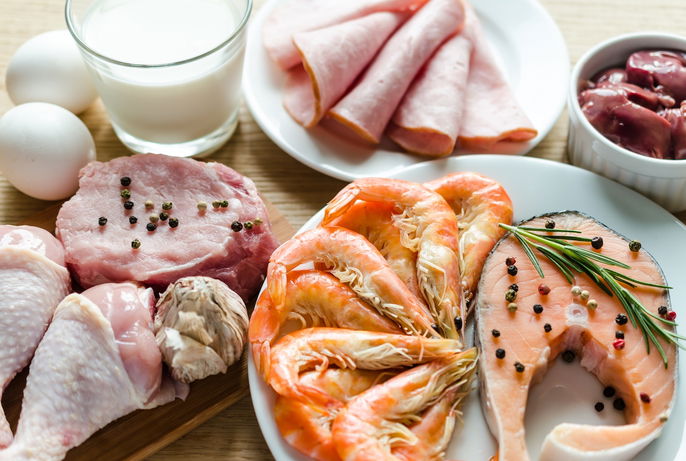Methionine is an essential amino acid that plays an important role in building muscle mass, strengthening the immune system, and wound healing.
Essential amino acids are not produced by the body and have to be obtained through food. High-protein foods like eggs, Brazil nuts, fish, beef, and milk are good sources of methionine.
Methionine can also be taken as a supplement, in the form of DL-methionine or L-methionine. These supplements are contraindicated in certain conditions and should only be taken with a doctor's supervision due to potential side effects.

Health benefits
Methionine plays an in important role in the following:
1. Helping to build muscle mass
Methionine plays an important role in protein synthesis that helps build muscle. Methionine also contributes to the production of creatine, an amino acid compound that provides energy to the muscles, improving physical performance and increasing muscle mass.
For best results, methionine should be included as one part of a healthy, well-balanced diet combined with regular physical exercise.
Check out other muscle building foods.
2. Strengthening the immune system
Amino acids like methionine are important for formation of the body's defense cells, helping to strengthen the immune system and combat illnesses caused by viruses, fungi, and bacteria.
3. Promoting healing
Methionine also plays a role in the formation of new tissues, blood vessels, cells, and collagen, promoting wound healing following an injury, tattoo, or surgery.
4. Protecting against premature aging
Methionine helps prevent premature aging by playing an important role in the formation of cysteine, an amino acid responsible for the production of glutathione, a potent antioxidant that helps combat free radicals that can damage healthy skin cells and lead to wrinkles and sagging skin.
5. Helping detoxify the body
Methionine promotes the formation of antioxidants that maintain a healthy liver, helping to detoxify the body and prevent fatty liver disease.
Also recommended: Liver Detox: Food, Drinks, Teas & More (with Meal Plan) tuasaude.com/en/liver-detoxFood sources
The following table provides information on foods high in methionine:
Other foods that contain methionine in smaller quantities include plain yogurt, black beans, milk, soy, and almonds.
A balanced diet that includes meat, eggs, nuts, and legumes will provide adequate amounts of methionine for the body.
Also recommended: 33 High Protein Foods (per 100 g) - Animal & Plant-Based Lists tuasaude.com/en/high-protein-foodsRecommended amounts
The recommended daily values for methionine are combined with cysteine, and vary according to age and sex:
- Babies between 7 and 12 months of age: 43 mg of methionine + cysteine per kg of body weight per day;
- Children aged 1 to 3 years: 28 mg of methionine + cysteine per kg of body weight per day;
- Children aged 4 to 8 years: 22 mg of methionine + cysteine per kg of body weight per day;
- Boys aged 9 to 13 years: 22 mg of methionine + cysteine per kg of body weight per day;
- Girls aged 9 to 13 years: 21 mg of methionine + cysteine per kg of body weight per day;
- Boys aged 14 to 18 years: 21 mg of methionine + cysteine per kg of body weight per day;
- Girls aged 14 to 18 years: 19 mg of methionine + cysteine per kg of body weight per day;
- Adults 19 years old and above: 19 mg of methionine + cysteine per kg of body weight per day.
People who are pregnant need to consume 25 mg of methionine + cysteine per kg of body weight per day. During lactation that amount increases to 26 mg of methionine + cysteine per kg of body weight per day.
When to take supplements
Methionine supplements may be prescribed by a doctor to strengthen the immune system, relieve pain, or help treat liver toxicity caused by medication or hepatic steatosis (fatty liver disease).
The recommended dose of DL-methionine or L-methionine is usually between 200 and 1000 mg per day, taken with a full glass of water or juice with food or immediately following a meal.
Dosing will vary based on age. Methionine supplements should only be taken if advised by a doctor.
Side effects
Methionine supplements can cause side effects like nausea, vomiting, low blood pressure, and somnolence (tiredness).
Contraindications
Methionine supplements are contraindicated during pregnancy and lactation.
Methionine supplements should not be taken by people with homocystinuria, a rare condition involving the buildup of excessive amounts of homocysteine and melatonin in the body.
People with liver disease or who are taking any medications regularly should talk to their doctor before taking methionine supplements.






























